Despite staffing and supply woes, Madison restaurants find hope as covid recedes
After two years of weathering reduced demand and public health rules during a pandemic, restaurant owners and workers in a city that prides itself on its dining scene are optimistic about their prospects as another spring begins.
By Gaby Vinick
March 3, 2022 • South Central Region
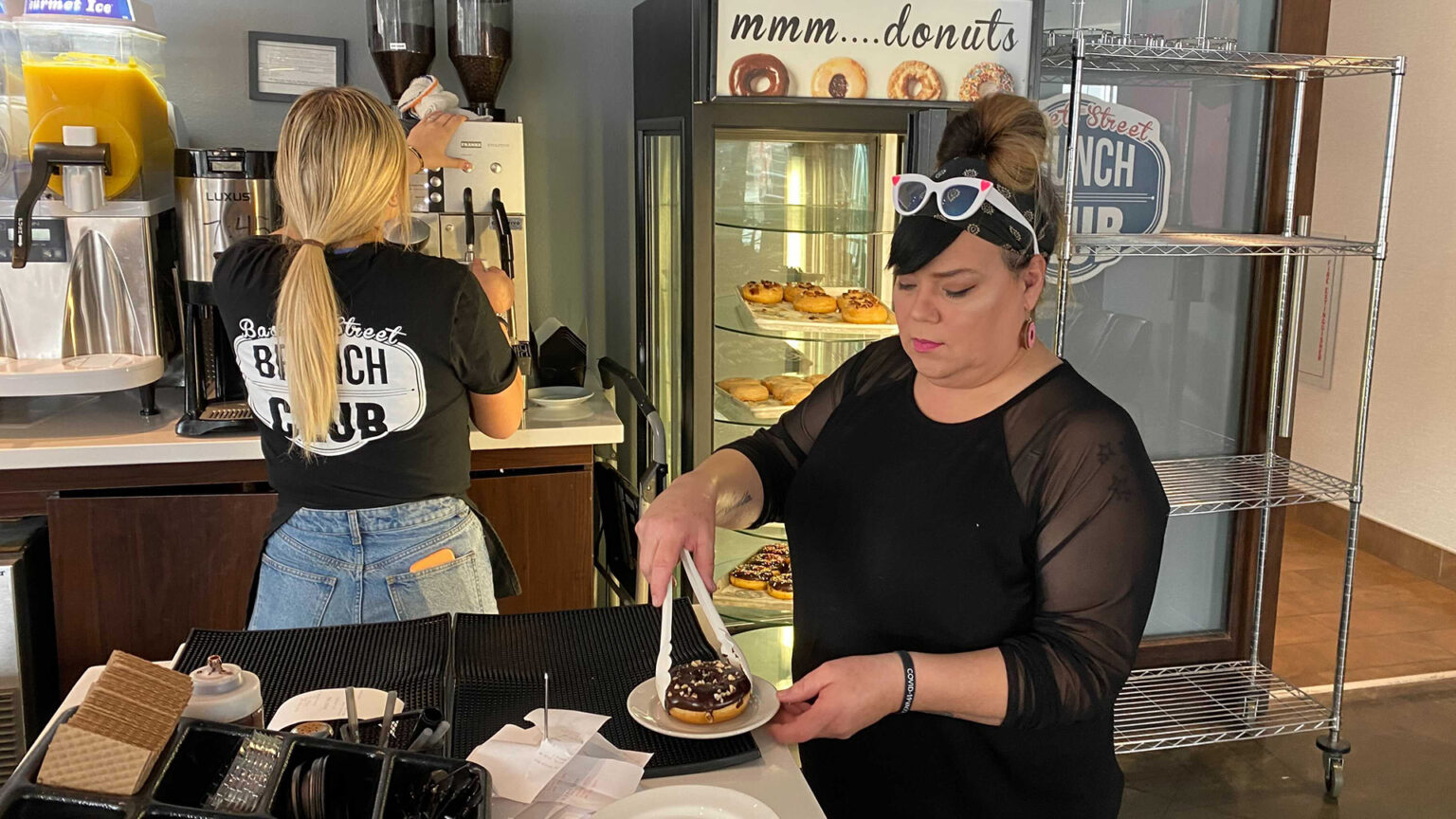
Dina Martinez is general manager of Bassett Street Brunch Club, a restaurant near the University of Wisconsin-Madison campus that is known for its donuts. Martinez urges restaurant patrons to show support for local businesses as they struggle with ongoing staffing and supply chain issues as the COVID-19 pandemic recedes. (Credit: Gaby Vinick / PBS Wisconsin)
Dina Martinez built plenty of experience in the restaurant business after she moved from Los Angeles to Madison in 2012. She found work at Monty’s Blue Plate Diner, Tex Tubb’s Taco Palace and Eldorado Grill, to name a few.
Yet the coronavirus pandemic created a new set of challenges for Martinez, who in December 2021 started as general manager of Bassett Street Brunch Club, where she had previously been a bartender.
After just two weeks on the job, Martinez said six staff members couldn’t work for five to ten days after contracting COVID-19. Halting sit-down service, the restaurant opted for to-go boxes.
“I think that’s something I wish people would understand,” said Martinez. “We’re not just closing down because we don’t want to serve you. We’re closing down because we’re gonna make sure our staff are taken care of and that our customers or guests are protected.”
The pandemic has dealt a heavy blow to many independent restaurants as owners and employees grapple with inconsistent demand, staff shortages, supply chain disruptions and changing public health regulations. In Madison, many restaurants have closed their doors, battered by financial uncertainties wrought by the pandemic.
Even as COVID-19 metrics are swiftly declining nationwide and throughout the state, Madison restaurants continue to face economic difficulties.
Yet with the Dane County mask mandate having expired March 1, some restaurant owners and workers are hopeful for the future. The 2022 State of the Restaurant Industry report issued by the National Restaurant Association found that the food service industry workforce is expected to add 400,000 jobs across the United States by the end of 2022. Still, more than half of restaurant operators contend business conditions won’t return to normal for at least a year or more.
Perseverance and support
Patrick O’Halloran, co-owner of the Tipsy Cow taverns in downtown Madison and Sun Prairie, and co-owner and chef at Lombardino’s, said the only financial support he received for these businesses was from the Paycheck Protection Program. The aid helped offset costs over the short-term, but surviving in the long-term is another story.
Adding to O’Halloran’s pressures is an ongoing struggle to hire more staff, despite advertising health, dental and vision benefits, levers intended to attract new workers.
“We do a lot of things for a small independent local company, but it isn’t translating into getting hires,” O’Halloran said. “We’re still struggling with the hiring and all that, but we have mixed feelings. We want to get back up and going, but also, I have diabetes. My wife has leukemia, so we also want to err on the side of caution, too.”
Dina Martinez echoed that sentiment, saying that while Bassett Street Brunch Club does not face staffing shortages at the moment, there is always the possibility that anyone can contract COVID-19. However, the high vaccination rate for Dane County, which sits at nearly 80% as of the beginning of March, offers some hope. At the state level, 60.4% of Wisconsinites have completed their vaccination series as of March 2, according to the Wisconsin Department of Health Services, while 63.9% of the population has received at least one dose.
O’Halloran has been reluctant to mandate proof of vaccination upon entry to his restaurants, fearful it will alienate patrons when these businesses are already in a vulnerable state.
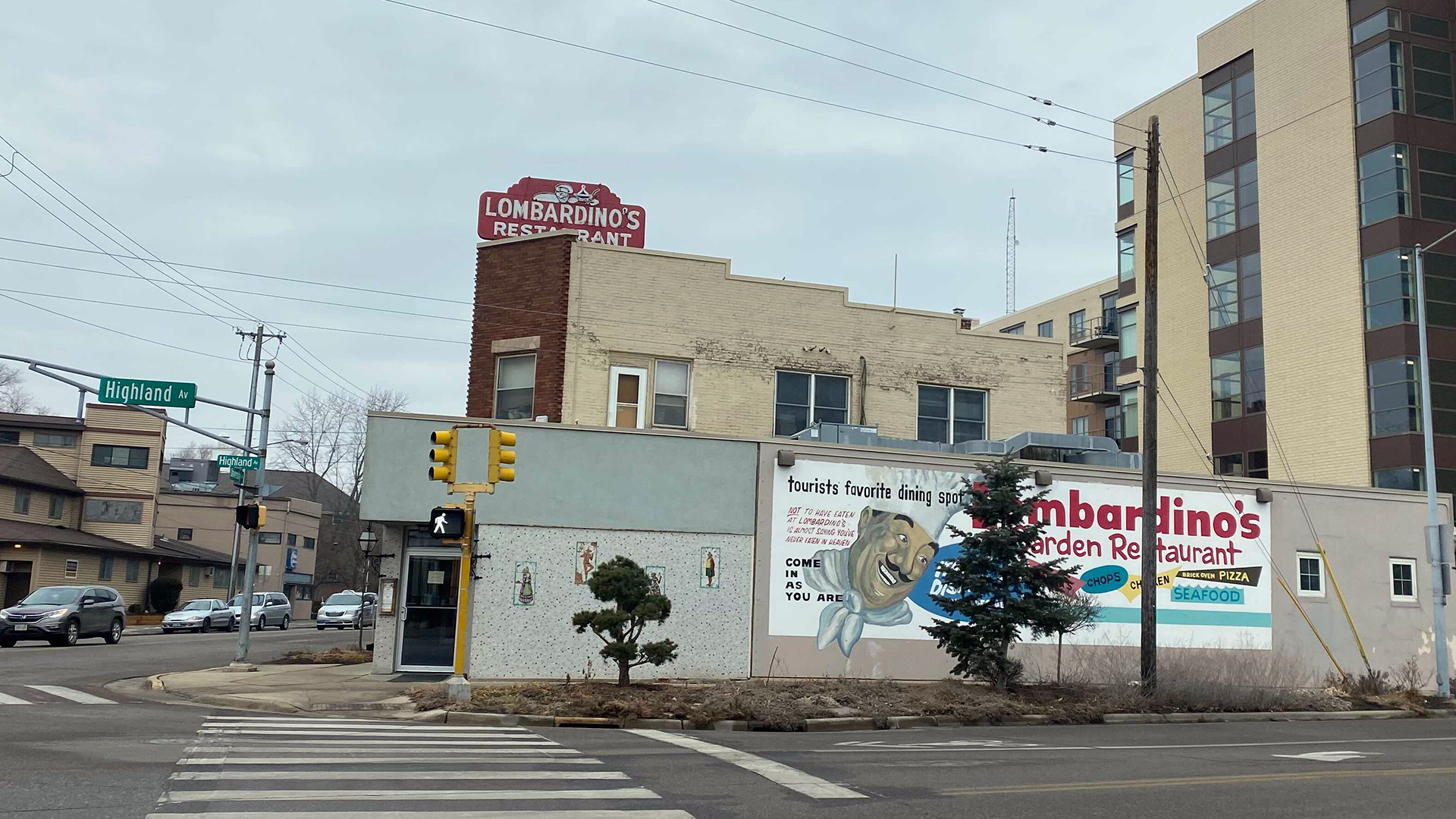
Lombardino’s is an Italian restaurant on Madison’s near west side that has operated in its current location for seven decades. Patrick O’Halloran has been a co-owner and the chef at the restaurant since the turn of the century, and that enduring the COVID-19 pandemic as a business has been difficult. (Credit: Gaby Vinick / PBS Wisconsin)
While a few new faces have joined the ranks at Lombardino’s, it is only operating four days a week. Any chance of going back to seven days of dinner will only be possible if O’Halloran can add four or five more people in the kitchen or servers in the front of the house. However, he is still reeling from the burnout that came with labor shortages and the extra hours he puts in to keep the business afloat.
“You just have to have this intestinal fortitude that you have to get it done,” O’Halloran said.
Meanwhile, the Tipsy Cow location in Sun Prairie is “not on track for what it should be doing,” O’Halloran noted.
“We had a restaurant that was one year old that we had built from scratch, and then the pandemic hit, and there was really no relief,” he said.
In response, O’Halloran and his family started a spice blending business, noting the benefits of selling a tangible product that doesn’t require in-person staffing.
Restaurants continue to be hard work
For Francesco Mangano, chef and owner of Osteria Papavero, other issues beyond difficulties in simply finding staff beset the dining business. Many workers at this downtown Madison restaurant lack experience, and in its case, most work part-time.
“For me it’s normal to work more than 40 hours,” said Mangano.
“We have cooks, especially the young ones, that think that working four shifts, six hours each, is a tremendous amount of time spent at work,” he continued.
Mangano pointed to a dishwasher who has worked at Osteria Papavero for the past 15 years. “There’s immigrants from Mexico here that work two jobs and work like 50, 60 hours a week to bring food home,” he said, and “also send money to Mexico to their families.”
“The service industry has to respond to this labor shortage and pay as competitive wages as possible, which means raising prices of the goods that they offer,” said Madison Ald. Mike Verveer, who represents District 4, covering a dense portion of central Madison filled with restaurants. As a member of the Madison Central Business Improvement District Board, he said a number of groups share similar concerns over labor shortages to him.
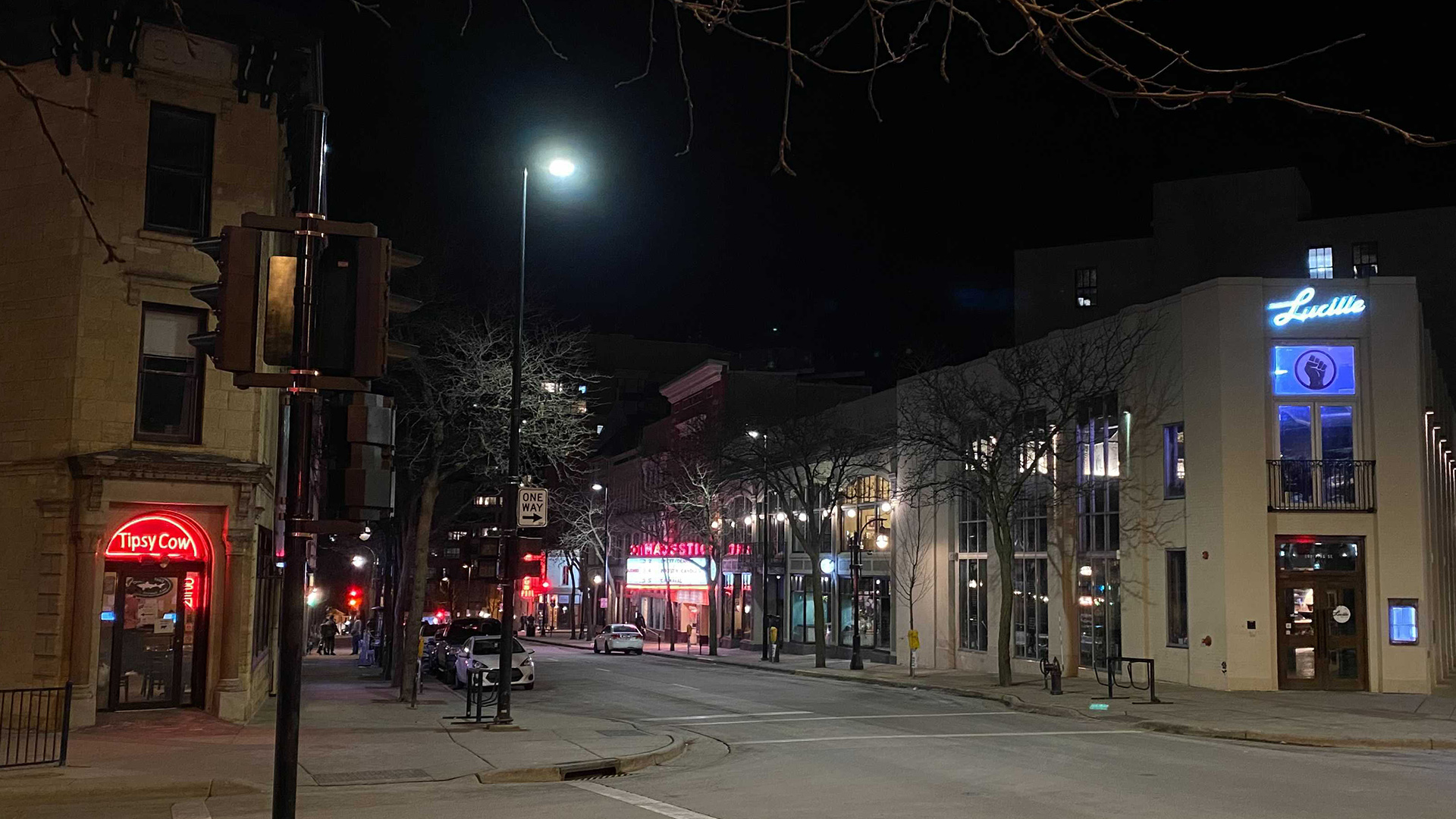
King Street in Madison, which extends east from the Capitol Square at the heart of the city, marks one of several clusters of restaurants in the downtown area. (Credit: Gaby Vinick / PBS Wisconsin)
“I think Madison will have to reckon with the possibility that [there’s] going to be a pretty sharp decline in local restaurants,” Mangano said. “If you love this business, come work it. Otherwise, some of these places will disappear, I can bet money on that.”
In addition to upending the experience of eating out, the pandemic has also challenged chefs to get more creative in the kitchen.
As delivery and carryout orders grew in popularity, chefs had to think more critically about which ingredients would still provide flavor for an enjoyable meal on the go.
“Some of the hardest cooking shifts we’ve ever had have been during the pandemic because you throw just crazy amounts of carryout into the bag. And we’re at the point where I know it’s stressful in the kitchen, but we have to take whatever we can,” said Patrick O’Halloran. He predicts carryout will remain popular in the future. That forecast may not be far off: delivery orders accounted for nearly one-tenth of total U.S. restaurant sales in 2021.
Workplace conditions at restaurants, large and small
As the restaurant industry imagines new possibilities for a post-pandemic landscape, one desire at the forefront of the drive to hire more people is creating a healthy and safe workplace environment, at least for some businesses.
“I feel like we’re really getting the hang of it and realizing that people are our greatest resource,” said Dina Martinez. “If we’re not taking care of our people, then we can’t take care of people that come into our restaurant.”
Martinez said it’s critical for people to support local restaurants. It’s estimated that roughly 90,000 restaurants have closed since March 2020, even as big chains weathered the financial storm.
“We tend to forget about those [restaurants] that are underfunded, which is a travesty,” she added.
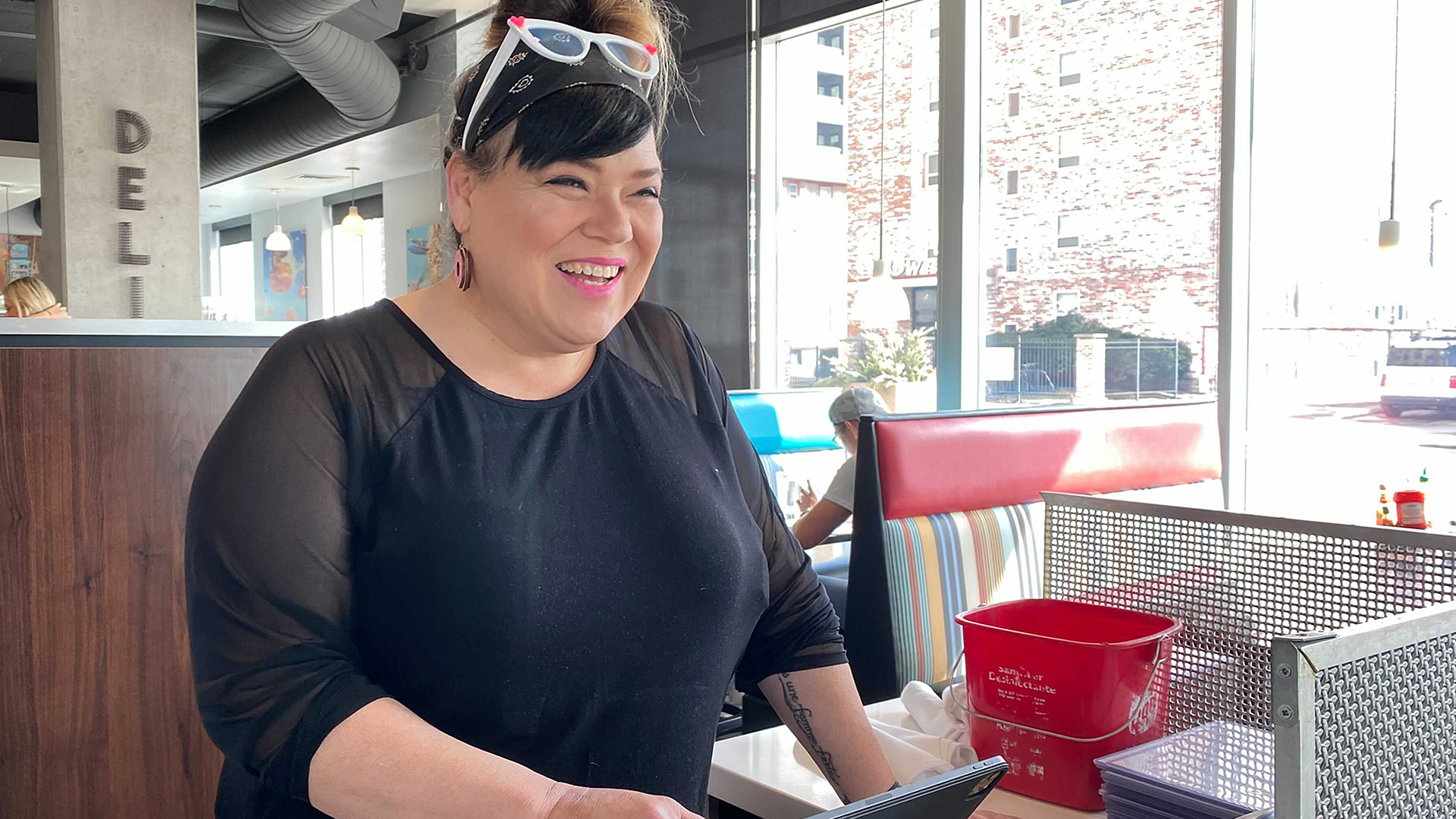
Bassett Street Brunch Club general manager Dina Martinez welcomes diners to the restaurant located near the University of Wisconsin-Madison campus. She is wary about potential continuing threats posed by COVID-19 but is hopeful about falling pandemic numbers and an increased interest among consumers to dine out again more regularly. (Credit: Gaby Vinick / PBS Wisconsin)
Francesco Mangano said that competing with chains brings a host of new challenges to the table. As Americans demand higher wages amid what’s come to be called the ‘Great Resignation,’ many employees can work for chain restaurants that offer wages typically paid for management positions at independent, fine-dining restaurants like Osteria Papavero.
“On top of seeing possibly local restaurants declining here in Madison, I have the feeling that a lot of people that come out of culinary schools or decide to switch work environments, they might actually end up working in those places — not local restaurants, just because they’re paid more,” he said.
The National Restaurant Association has a record of opposing efforts to raise the minimum wage and require paid sick leave to employees. However, many restaurants in Madison are working to change potential assumptions about their workplace conditions. Martinez said the industry is experiencing a shift, spurred by concerns for the health and well-being of its workers.
“I feel like as a whole, the industry is trying, at least caring a little bit more about the people component,” she said. Martinez has worked at multiple operations within the Food Fight Restaurant Group — a company that comprises nearly 20 Madison restaurants —but had a fair stint working for other employers throughout her career as well. There were times when she fell ill, yet was still expected to work and wait tables.
Now, as a general manager, she tells her employees to not come in if they call and say they’re sick.
“I’ve seen us care a little bit more about the human aspect behind our organization, even though I feel like Food Fight kind of had that in place. I feel like we’re looking at the holistic human that works within an organization now in a way that I don’t think we were as conscious about,” Martinez said. As a trans person, she felt accepted as a member of the company’s staff.
A new road map for food service
Although Dina Martinez is content with staffing levels at Bassett Street Brunch Club, she said the biggest struggle as pandemic regulations wind down is dealing with supply chain issues. It’s the little things that may be taken for granted — getting a napkin, the right lid to fit a cup and other necessities.
Tiffany Kenney, executive director for Madison’s Central Business Improvement District, emphasized that offering flexibility and choices will be key for restaurants and customers. In anticipation of mask mandates ending, she stressed a need for patience as restaurants make adjustments.
“It is going to be a challenge for [businesses] to get the supplies to get up and running,” said Kenney.”
She pointed to providing curbside pickup options and ensuring the downtown area remains accessible to all.
“I think that’s one of our challenges right now is how do we get these unique, diverse restaurants consistent support?” she said. “For the community, they need to support their favorite places at the time and the pace that they’re ready to, and I’m hopeful that most of our restaurants are able to accommodate an increase in customers when it’s right.”
In addition to high vaccination rates in Dane County offering restaurateurs some confidence for their business prospects in 2022, they are also ready to welcome warmer weather.
Patrick O’Halloran said summer is essential to financial recovery from the fallout of the pandemic. Lombardinos, for instance, welcomed more customers by opening up a patio in its private parking lot in 2020.
The city of Madison is aiming to continue its “Streatery” program, which it launched in the summer of 2020 after the pandemic first struck. This well-received initiative allows restaurants and taverns to provide and expand outdoor seating options. City council members is scheduled to vote March 15 on whether to make the program permanent.
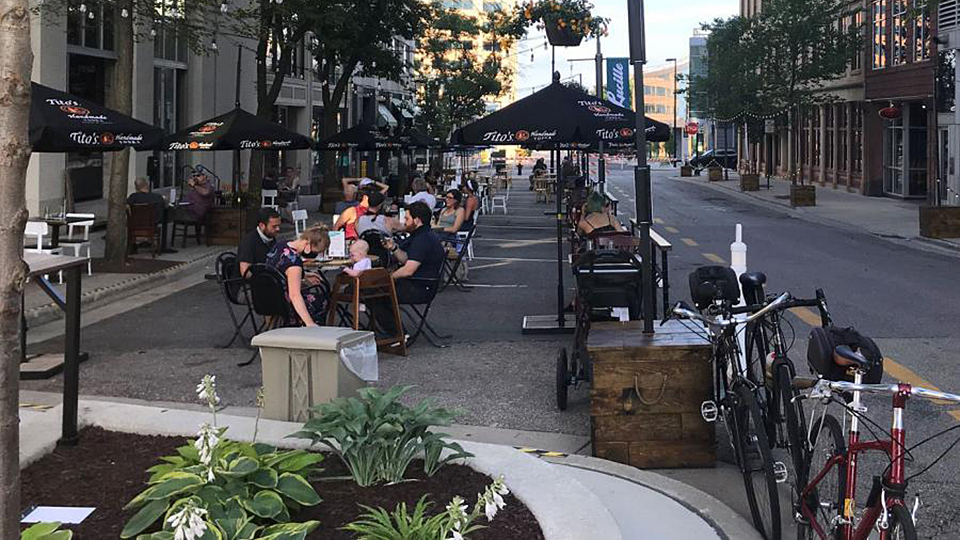
The city of Madison launched its Streatery program in the summer of 2020 in an effort to provide extra capacity for restaurants in the midst of the COVID-19 pandemic. Participants set up tables for customers on adjoining streets to allow for al fresco dining. The Madison Common Council is considering to make this program permanent. (Credit: Courtesy of the city of Madison)
The conventional ups and downs of the restaurant business notwithstanding, O’Halloran is also riding a wave of optimism.
“I’m optimistic because I think there is cabin fever. It’s been two years of people not having a normal life in one way or another,” he said. “Everybody’s life has been impacted, so I think there’s going to be a natural surge of customers coming out, people wanting to go out, to celebrate [and] get back to normalcy.”
At the Bassett Street Brunch Club, seven staff members stopped by one afternoon to study for school and hang out with Dina Martinez and one other.
“The last few years have really been hard for me because I want to be around people. I need attention. I want to give attention. There’s something about it that feeds me,” she said, pointing to feelings of community within the food service industry. “Being back in the restaurant, I realized how much I missed the way that restaurant people interact with each other and our experience with our guests.”
Martinez continued with a laugh. “Watching people fight and hate each other,” she said, “one thing we can agree on is that pancakes and waffles are amazing.”
 Passport
Passport











Follow Us